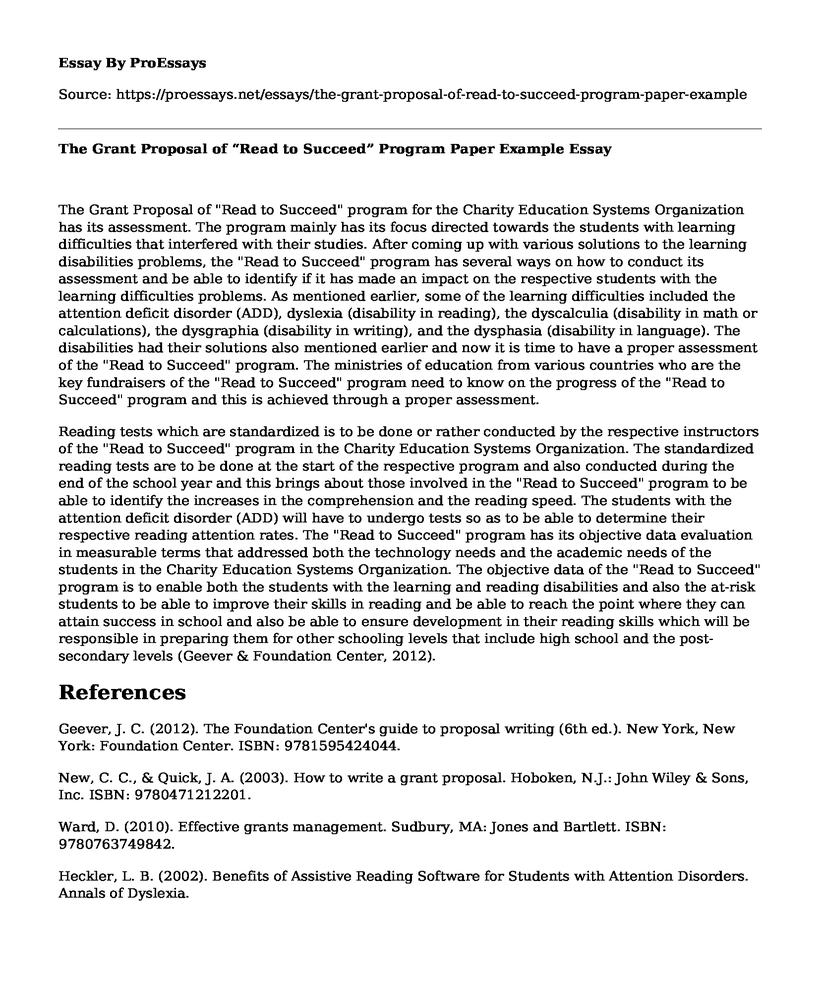The Grant Proposal of "Read to Succeed" program for the Charity Education Systems Organization has its assessment. The program mainly has its focus directed towards the students with learning difficulties that interfered with their studies. After coming up with various solutions to the learning disabilities problems, the "Read to Succeed" program has several ways on how to conduct its assessment and be able to identify if it has made an impact on the respective students with the learning difficulties problems. As mentioned earlier, some of the learning difficulties included the attention deficit disorder (ADD), dyslexia (disability in reading), the dyscalculia (disability in math or calculations), the dysgraphia (disability in writing), and the dysphasia (disability in language). The disabilities had their solutions also mentioned earlier and now it is time to have a proper assessment of the "Read to Succeed" program. The ministries of education from various countries who are the key fundraisers of the "Read to Succeed" program need to know on the progress of the "Read to Succeed" program and this is achieved through a proper assessment.
Reading tests which are standardized is to be done or rather conducted by the respective instructors of the "Read to Succeed" program in the Charity Education Systems Organization. The standardized reading tests are to be done at the start of the respective program and also conducted during the end of the school year and this brings about those involved in the "Read to Succeed" program to be able to identify the increases in the comprehension and the reading speed. The students with the attention deficit disorder (ADD) will have to undergo tests so as to be able to determine their respective reading attention rates. The "Read to Succeed" program has its objective data evaluation in measurable terms that addressed both the technology needs and the academic needs of the students in the Charity Education Systems Organization. The objective data of the "Read to Succeed" program is to enable both the students with the learning and reading disabilities and also the at-risk students to be able to improve their skills in reading and be able to reach the point where they can attain success in school and also be able to ensure development in their reading skills which will be responsible in preparing them for other schooling levels that include high school and the post-secondary levels (Geever & Foundation Center, 2012).
References
Geever, J. C. (2012). The Foundation Center's guide to proposal writing (6th ed.). New York, New York: Foundation Center. ISBN: 9781595424044.
New, C. C., & Quick, J. A. (2003). How to write a grant proposal. Hoboken, N.J.: John Wiley & Sons, Inc. ISBN: 9780471212201.
Ward, D. (2010). Effective grants management. Sudbury, MA: Jones and Bartlett. ISBN: 9780763749842.
Heckler, L. B. (2002). Benefits of Assistive Reading Software for Students with Attention Disorders. Annals of Dyslexia.
Cite this page
The Grant Proposal of "Read to Succeed" Program Paper Example. (2022, Jul 25). Retrieved from https://proessays.net/essays/the-grant-proposal-of-read-to-succeed-program-paper-example
If you are the original author of this essay and no longer wish to have it published on the ProEssays website, please click below to request its removal:
- Impact of Monetary Policy Surprises in the German and US Markets
- Essay on Junk Foods Should Not Be Sold In Public Schools Vending Machines
- Essay Sample on Recognition of Deferred Revenues
- Essay Sample on Child Maltreatment and Psychopathic Traits in Youth
- Audit: Detecting Fraud & Uncovering Financial Breach - Essay Sample
- Paper Example on Universities Uphold Environmental Sustainability: ACUPCC's Commitment to Climate Change
- Free Research Paper Sample on Funding for Health Department







